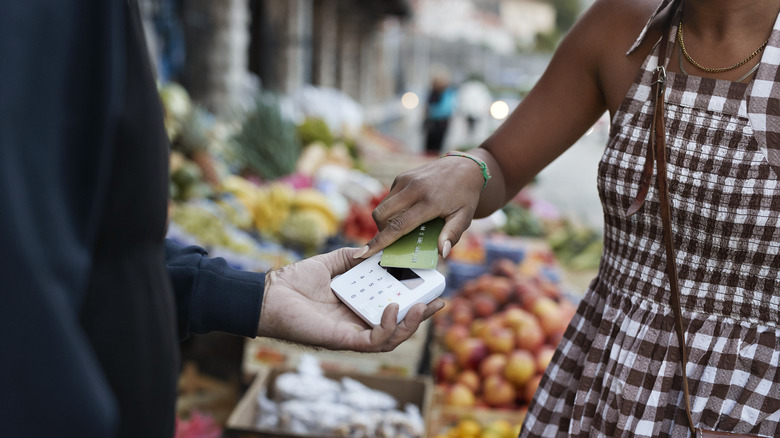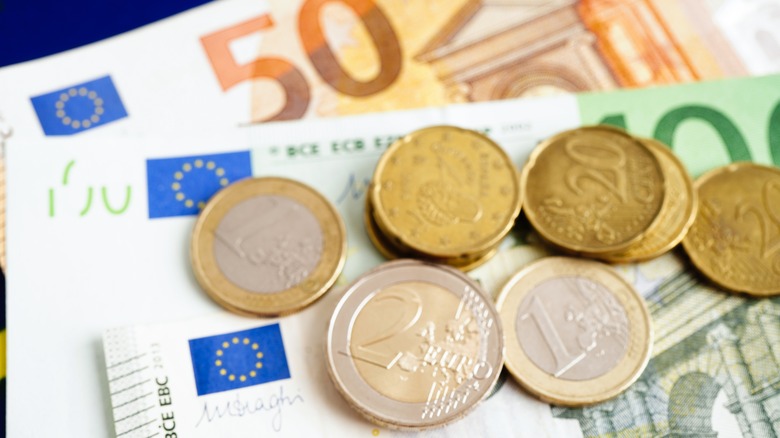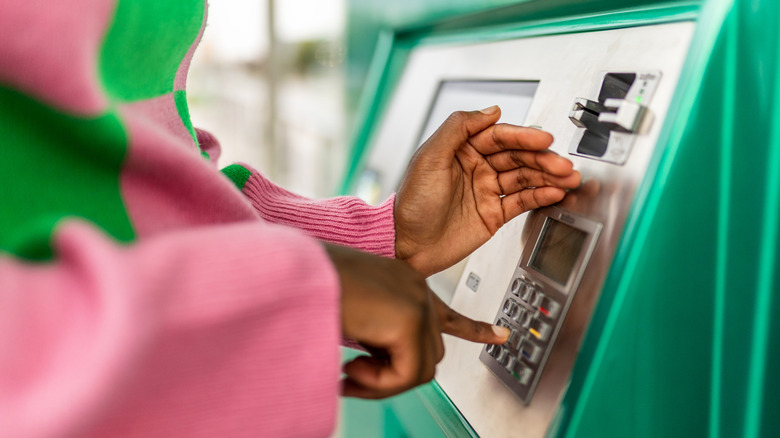Why Rick Steves Avoids Debit Card Purchases When Traveling In Europe
When it comes to traveling abroad, there can be a lot of different financial considerations to keep in mind. From unnecessary purchases during your travel to where, exactly, to keep your money while abroad, financial considerations can go far beyond the budgeting phase of your trip planning. That isn't to say budgeting isn't a significant factor when planning a trip. In fact, for many it can be the ultimate deciding factor when considering things like where to travel to, and for how long. According to the Bureau of Labor Statistics, as of June 2025, the Consumer Price Index is up 2.7% when compared to the year prior. Even worse, per NerdWallet's Travel Inflation Report for July 2025, overall prices across all travel categories have increased a whopping 35.3% in the last 10 years, meaning your money doesn't go as far as it used to — especially when planning a trip.
With that said, perhaps one of the most important financial tips to keep in mind while traveling has to do with keeping your debit card safely in your wallet. As travel expert, TV host, and writer, Rick Steves explained on his site, Rick Steves' Europe, "Because a debit card pulls funds directly from your bank account, potential charges incurred by a thief will stay on your account while your bank investigates." However, it's important to keep in mind that debit cards are just one of many types of cards that can end up costing you while traveling. With that said, Steves also added, "For that reason, I limit my debit card use to cash-machine withdrawals."
How to pay instead
Rick Steves explained that, while he is traveling, he is very specific about how he pays, "To make purchases, I pay with a credit card or cash." While cash can carry an inherent risk of being stolen or lost, it can also make it easier to pay for smaller items with local vendors or stores who might not always have card machines on hand. Cash can also sometimes get you better prices on items, especially if a business charges a credit card processing fee. With that in mind, it's important to be smart about your cash and remember basics like not pulling all of your cash out at once.
The reason paying with a credit card, instead of a debit card, can be so important has a lot to do with the inherent security available with most credit cards. Unlike debit cards, which can leave you with an almost infinite amount of losses depending on how long it takes you to notice and report missing funds, credit cards have a $50 maximum liability for fraudulent credit card transactions. Plus, most credit card issuers will flag suspicious charges, and quickly – often before you might even have a chance to check your account yourself. This quick action can help to put a block on any further charges, helping you avoid more hassle. Another particularly important element of credit cards is that money stolen from this card isn't tied to actual money in your account the way a debit card is. This means that you have more time to notice and dispute any charges on your statement, without actually being out any money.
Financial tips to remember abroad
Beyond avoiding using your debit card, you might consider a broader wallet clean-out before boarding your flight. For instance, keeping retailer-specific credit cards, membership cards, or even ATM cards to lesser-used accounts can all add bulk to your wallet and/or bag while also being a potential hazard to replace. With that in mind, you might consider adding a photo of a dog to one of these newly cleared out slots in your wallet since it could mean your wallet is more likely to be returned to you in the event you lose it.
Another consideration to keep in mind is that your card information can still be stolen, if the card remains physically safe in your wallet. It's important to always assess the quality of an ATM you might use, before actually using it, during your travels. As Rick Steves explains, "Before inserting your card into an ATM, inspect the front of the machine (especially if it's not inside a bank). If anything looks crooked, loose, or damaged, it could be a sign of a card-skimming device." Standing at an ATM machine can also be a weak spot for potential theft, so it's also important to consider where the ATM is located, how exposed you might be, and if anyone is nearby. Steves warns, "Pay attention to strangers loitering near a cash machine, especially if they're in pairs (a common tactic is for one person to distract you while the other grabs your cash). You're most vulnerable just after you have entered your PIN and the withdrawal amount."


